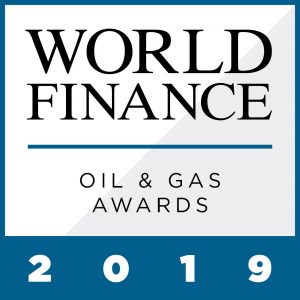Oil & Gas Awards 2019

Over the past five years, market volatility has become the new normal for the oil and gas industry. Ongoing trade disputes, geopolitical tension and sanctions on oil-exporting nations have sent crude prices oscillating, while global demand has been unpredictable. Amid all this uncertainty, though, there has been a sense of cautious optimism sweeping the sector.
Valuable lessons have been learned from the 2014 oil crash and the downturn that followed. With crude now swinging between $60 and $70 per barrel, prices might be far from the historic highs of the early 2010s, but they have certainly picked up since their post-crash slump. These higher, healthier prices are decidedly encouraging, and the industry has shown remarkable resilience in the face of volatility.
The turbulence of recent years has shown that the oil and gas sector is able to cope with hardships, from supply chain disruption to sustained low prices. But, as we look towards 2020 and beyond, the industry’s biggest challenge is much more existential. Climate change has been described by the UN as “the defining issue of our time”, and we are witnessing a global push towards green energy sources, prompting oil and gas companies to reassess what their role might be in the future. This year’s World Finance Oil and Gas Awards celebrate the companies that meet such challenges with confidence and a will to succeed.
Go green or go home
The question of sustainability is unavoidable, and oil and gas companies of all sizes need to examine how they can make their existing operations more environmentally friendly
While green energy is becoming more commonplace, fossil fuels are not set to disappear anytime soon. Indeed, many industry experts are predicting that the demand for oil and gas will continue to grow over the next two decades, driven primarily by emerging markets in China and India. In fact, BP believes oil demand will not hit its peak until the mid-2030s if the current rate of change continues. This leaves oil and gas companies in something of a double bind – they must produce enough energy to meet this growing demand, while also reducing their carbon emissions.
Firms are looking to deal with this challenge in a number of ways: larger companies can use their deep pockets to acquire smaller green energy providers, allowing them to diversify into the world of renewable energy without having to build the infrastructure from scratch. Others – Denmark’s Ørsted being a prime example – are transforming themselves into green energy companies by phasing out fossil fuels and shifting towards low-carbon alternatives. Ørsted has cut its carbon emissions by over 50 percent since 2006 by refocusing its business on wind and solar energy. As stakeholders and consumers grow more conscious of environmental issues, we may see similar pivots to renewables from leading oil and gas companies in the years to come.
A comprehensive clean-up
The question of sustainability is unavoidable, and oil and gas companies of all sizes need to examine how they can make their existing operations more environmentally friendly. This is a practical way for smaller companies to reduce carbon emissions, as it doesn’t require a costly expansion into alternative energy sources. By eliminating methane and CO
2
leaks from existing infrastructure, properly maintaining equipment and considering carbon offsetting strategies such as reforestation, companies can make their current operations more effective and less environmentally damaging.
Since the signing of the landmark Paris Agreement, the world has been moving towards a low-carbon future. Renewable energy is set to play a crucial role in this transition, helping countries meet their ambitious emissions targets and reduce their carbon output. According to British energy giant
For smaller companies with less financial flexibility, however, these large-scale transformations and ambitious acquisitions simply might not be feasible. Fortunately, there are several cost-conscious steps that companies can take to improve their services and appeal to an increasingly eco-friendly customer base.








